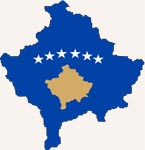Independent, Kosovo still depends on the world to survive
 Pristina - Kosovo declared independence from Serbia a year ago, but foreign diplomats and local observers agree that it is more dependent than ever before.
Pristina - Kosovo declared independence from Serbia a year ago, but foreign diplomats and local observers agree that it is more dependent than ever before.
The illusion fomented by politicians, that independence would quickly end economic and social misery, has evaporated. Instead, the majority of Albanians have come to a rude awakening.
Its promotion in the United Nations blocked by Serbia's ally Russia, the new mini-state has been eagerly awaiting more international recognition - 54 countries, including western powers, acknowledged it so far.
The UN mission UMIK, in Kosovo since 1999, still has a hand on the steering wheel, now along with the European Union's Eulex, which the West wanted in the driver's seat as of this year.
With the moribund economy still waiting for substantial foreign investments, the unemployment rate hovers above 40 per cent and many Kosovo Albanians depend on aid from relatives working in the West.
Though billions of dollars have been pumped into Kosovo since the war, there is only an occasional glimpse of something shiny and new such as a few kilometres of highway toward Albania. NATO-led peacekeepers also resurfaced roads here and there.
If the promise by Prime Minister Hashim Thaci survives the test of the global financial crisis, Kosovo will this year at least sign a contract for the construction of a
3.5-billion-euro (4.54 billion dollars) power plant intended to alleviate the horrid energy situation.
Kosovo remains landlocked amid jurisdiction wrangling of UNMIK and Eulex, which helps the Serb minority that is dominant in the northern section of Kosovo resist Pristina's authority.
This leaves one-quarter of Kosovo's territory in virtual lawlessness and provides a gaping hole for local and international smugglers of just about anything, from petrol to human beings.
The lack of progress in implementing laws, which Eulex is yet to push along but which may still face huge problems in the north, only further encourages rampant corruption.
Kosovo is perceived as very corrupt - not only because local politicians and bureaucrats hold their hand out to get things done, but also because many of the well-paid international officials do it, too.
The huge foreign presence has also prompted huge unbalances in the local work and value system: A a university professor today earns about 450 euros in Kosovo, while a driver with an international organization makes 600-800 euros.
The crippling problems are likely to stay a long time in Kosovo. To many, it appears that Kosovo lost its place near the top of the international agenda as soon as the immediate risk of renewed bloodshed abated.
Indeed, many observers argue it Kosovo could well be on its way to become a frozen conflict, as no foreign power seems willing to expend more effort to a push for the final settlement of what and whose Kosovo is.
Diplomats in Pristina admit as much. The crucial principle was to preserve peace, they say and point to the example of Cyprus, the Mediterranean island-nation divided since 1974.
And in all this, the issue is not only that Serbia refuses to formally cede what it considers as its heartland province. Equally problematic is that the fate and status of 6 million Albanians, strewn across Albania, Kosovo, southern Serbia, Macedonia and Montenegro, hinges on the outcome for Kosovo. (dpa)